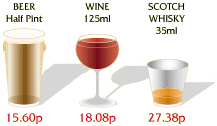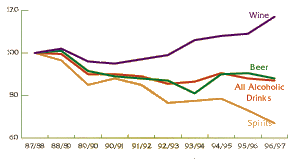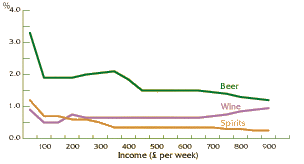 |
Introduction |
|
|
|
This Government is committed
to fair, transparent and effective taxation for the UK. The Scotch Whisky industry seeks
the same for alcoholic drinks. |
|
|
|
By freezing the duty on
spirits in the 1998 Budget, which had the effect of narrowing tax discrimination in
relation to wine and beer, the Government took a modest step toward meeting those taxation
objectives in the context of alcoholic drinks. |
|
|
|
But there remains a long
distance to travel if severe discrimination against spirits in the UK is to be eliminated. |
|
|
|
Drinks tax discrimination
benefits neither the consumer, the Government nor UK plc. Revenue receipts from spirits
are falling. The UK drinks market is changing rapidly. The current tax structure, whose
shape was formed 80 years ago, does not reflect this. |
|
|
|
The 1998 spirits rate
standstill provides an opportunity for reform: make this the first step in a process of
reform of drinks taxation to create a fair, appropriate and equitable system for the new
century. |
|
|
Why is
reform necessary? |
|
|
The current
system is not fair. |
|
|
|
At the moment, two thirds of
the price of a typical bottle of Scotch Whisky is swallowed up by excise duty and VAT. On
a bottle of wine, the comparable figure is nearer one third. |
|
|
|
This differential has nothing
to do with differences in alcohol content. Regular pub measures of different drinks - all
of which contain comparable amounts of alcohol - are taxed at different rates. Scotch
Whisky is the highest. |
|
|
|
 |
|
|
The current
system is not effective |
|
|
|
All the evidence is that the
Treasury can no longer rely on raising additional revenues from alcoholic drinks. Total
excise duty receipts from all alcoholic drinks, measured in real terms, have fallen
by 13.5% in the last decade. Spirits revenue alone has declined by 32%. |
|
|
|
In 1992, a 24 pence tax hike
was followed by a loss of revenue receipts of £80 million. Standstills in 1993 and 1994
allowed the market to stabilise and the revenues started to recover. |
|
|
|
But a further 22 pence tax
hike at the end of 1994 was followed by a fall of £120 million in revenue receipts, from
which the Treasury has still to recover. |
|
|
The current
system has hit the point of diminishing returns |
|
|
|
Recent UK studies, including
one by the influential Institute for Fiscal Studies, show that the Government has
“run out of road” as far as raising more revenue from spirits is concerned. This
alone furnishes the logic for reform: review of the tax structure for alcoholic drinks
will provide the steer for reform. |
|
|
|
 |
|
|
The current
system is not transparent |
|
|
|
Current tax structures are a
muddle. They involve different and highly confusing categorisations. |
|
|
|
There are different rates of
duty — and the basis for their calculation varies widely — for each of the
principal categories: spirits, beer, cider, wine and sherry. Wine is further sub-divided,
with different rates of duty for light, medium, heavy and sparkling. |
|
|
|
There are different rates for
intermediate drinks and, yet again, for mixed drinks. |
|
|
|
Why not a simpler,
transparent and more straightforward system - easy for the consumer to understand,
uncomplicated to administer: a single rate of tax, levied according to alcohol content? |
|
|
The current
system is inequitable |
|
|
|
There is a generally accepted
taxation principle that the tax burden should be lighter on those goods and services which
are more important to those on lower incomes, and heavier on those predominantly purchased
by higher income groups. |
|
|
|
The Treasury does not hit
this target with its current system. Wine, beer, and spirits are consumed across income
groups. Income surveys show that there is no argument on equity grounds for taxing spirits
more heavily than the other categories. |
|
|
|
 |
|
|
The current
system hits employment |
|
|
|
Scotch Whisky companies offer
crucial employment. Scotch Whisky distilling operations are to be found mainly in remote
rural areas in Scotland. They provide vital rural jobs, and are frequently the mainstay of
fragile local economies. |
|
|
|
The distillery lies at the
heart of the community: if it goes, then the community surrounding it is under threat -
the village shop, the postman, the school teacher, the district nurse, the local garage,
the farmers, even the pub. |
|
|
|
Bottling and distribution
centres are mainly in Scotland’s central belt, which has seen the loss of many of its
traditional old-established heavy industries, and which as a result enjoys EU financial
support aimed at alleviating unemployment problems. |
|
|
|
There are currently around
12,400 people employed in the industry. The prestigious Fraser of Allander Institute has
calculated that one job in Scotch Whisky supports four others outside the industry. Thus,
the number of individual men and women who depend for their jobs upon a viable Scotch
Whisky industry is around 62,000. |
|
|
The current
system encourages cross border shopping |
|
|
|
Current drinks tax structures
encourage both legal and illegal cross-border trade. The industry is working with
government to help stamp out illegal smuggling, but an enormous perfectly legal trade is
inspired by current tax structures. |
|
|
|
Tax differences between
Britain and her continental neighbours are considerable: a bottle of Scotch costing £10 -
£11 in Dover can be £7 in Calais. Who can blame consumers for buying in low tax France
rather than over-taxed Britain . . . and who wins? Neither UK retailers nor the UK
Treasury, that’s for sure. |
|
|
|
Instead, we are exporting
sales, jobs and revenue receipts to France. Only radical reform and amendment of the
structure and levels of UK taxation will remedy this unedifying situation. |
|
|
The current
system stands in the way of European tax equalisation |
|
|
|
Completion in 1993 of the
Single European Market should have led to genuine tax harmonisation. Five years on,
Commissioner Monti is still struggling to come up with a fair system which could be
implemented across Europe. |
|
|
|
The UK Government can help by
pressing for equal tax treatment for spirits and other alcoholic drinks. No other
country will fight for this. |
|
|
|
The UK has the most at stake.
50% of the intra-European trade in spirits is generated from the UK, mostly by Scotch
Whisky. Europe’s numerous wine producing member states remain a powerful counter-
force. |
|
|
|
Unless the UK demonstrates
its commitment to equal tax treatment by establishing this in the domestic system, it will
be increasingly hard to fight for it with credibility in Europe. The current EU minimum
rates structure is discriminatory. Spirits must bear a far higher minimum rate than
beer. Wine - at zero - is not required to bear any tax. |
|
|
|
Worse: every member state
applies higher actual rates of duty to spirits than either to wine or beer. Wine
pays no tax in seven out of the 15 member states. |
|
|
|
| |
Austria |
Belgium |
Denmark |
Finland |
France |
| Wine |
nil |
426 |
856 |
2,162 |
30 |
| Beer |
347 |
425 |
780 |
2,888 |
257 |
| Spirits |
723 |
1,651 |
3,674 |
5,097 |
1,440 |
|
|
|
|
| |
Germany |
Greece |
Ireland |
Italy |
Lux |
| Wine |
nil |
nil |
2,559 |
nil |
nil |
| Beer |
196 |
309 |
2,049 |
351 |
197 |
| Spirits |
1,297 |
999 |
2,847 |
648 |
1,035 |
|
|
|
|
| |
NL |
Portugal |
Spain |
Sweden |
UK |
| Wine |
441 |
nil |
nil |
2,937 |
1,911
|
| Beer |
424 |
275 |
168 |
1,746 |
1,619 |
| Spirits |
1,497 |
814 |
686 |
5,955 |
2,843 |
|
|
|
|
(ECU per hectolitre of
pure alcohol) |
|
|
The current
system specifically hits UK plc |
|
|
|
The interests of Scotch
Whisky and those of UK plc are directly linked. |
|
|
|
By discriminating against
spirits at home, the government sends unmistakable signals to governments abroad
- particularly to the other member states of the European Union - that it is OK to
discriminate against spirits. |
|
|
|
In Europe, which accounts for
40% of Scotch exports, this makes little sense. |
|
|
Why
does all this matter? |
|
|
|
Scotch Whisky makes a huge
impact on the UK’s trade balance. |
|
|
|
Scotch is sold in more than
200 markets around the world. It is one of the UK’s top five manufactured exports,
generating export earnings per employee at twice the level of the second best performer,
electronics, and some seven times the average for manufacturing. |
|
|
|
In their submission to the
WTO, the Japanese, in defence of their infamous discriminatory tax on Scotch Whisky,
specifically mentioned tax discrimination both by the UK and the European Union against
their own domestic products. |
|
|
|
Industry leaders get the same
message on trade missions to other countries. The Chilean Ambassador in London recently
rebuffed SWA criticisms of his country’s tax regime by suggesting the
industry’s leaders should examine their own Government’s habits. |
|
|
The current
system does not match the Government’s own tax principles |
|
|
|
The Government, in its 1997 Red
Book on the principles of current taxation policy, clearly states:
“How and what is taxed sends clear
signals about the economic activities which governments believe should be encouraged and
discouraged, and the values they wish to entrench in society . . . A tax system should be
well designed, to meet the objectives of the government of the day, without generating
considerable side effects; it must keep taxpayers’ compliance costs to a minimum; it
should avoid the less well off bearing an unfair burden; and attention must be paid to any
implications for the United Kingdom’s international competitiveness”
|
|
|
|
Quite. |
|
|
Conclusion |
|
|
|
The Scotch Whisky industry
wholeheartedly endorses the principles set out above, and acknowledges the
Government’s commitment to tax reform. |
|
|
|
We believe that there is an
overwhelming case for this approach to be applied to alcoholic drinks taxation. |
|
|
|
Early review of the current
system would both provide the basis for modernisation of the structure, and would be
consistent with the interests of the industry, the consumer, the Government and UK plc. |
|
|
|
Edinburgh, 1998 |
|


